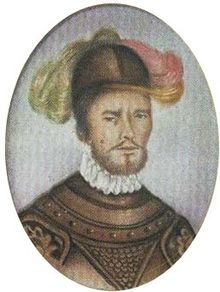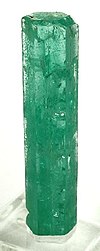Pedro de Ursúa: Difference between revisions
No edit summary Tags: Mobile edit Mobile web edit |
No edit summary |
||
| (5 intermediate revisions by 5 users not shown) | |||
| Line 9: | Line 9: | ||
| birth_date = 1526 |
| birth_date = 1526 |
||
| birth_place = [[Baztan (municipality)|Baztan]], [[Kingdom of Navarre|Navarra]] |
| birth_place = [[Baztan (municipality)|Baztan]], [[Kingdom of Navarre|Navarra]] |
||
| death_date = |
| death_date = January 1, 1561 |
||
| death_place = [[Amazon River]],<br>[[South America]] |
| death_place = [[Amazon River]],<br>[[South America]] |
||
| death_cause = Murder |
| death_cause = Murder |
||
| Line 49: | Line 49: | ||
| footnotes = |
| footnotes = |
||
}} |
}} |
||
'''Pedro de Ursúa''' (1526 – |
'''Pedro de Ursúa''' (1526 –January 1, 1561) was a Spanish [[list of conquistadors in Colombia|conquistador]] from [[Baztan (municipality)|Baztan]] in [[Navarre]].<ref name="DouglassBilbao2005">{{cite book|author1=William A. Douglass|author2=Jon Bilbao|title=Amerikanuak: Basques in the New World|url=https://books.google.com/books?id=8KzfK1QwxDIC&pg=PA84|year=2005|publisher=University of Nevada Press|isbn=978-0-87417-625-4|page=84}}</ref><ref name="GonzálezTur1981">{{cite book|author1=Elena Mampel González|author2=Neus Escandell Tur|title=Lope de Aguirre: Crónicas, 1559-1561|url=https://books.google.com/books?id=76qVv67CEPcC&pg=PR15|year=1981|publisher=Edicions Universitat Barcelona|isbn=978-84-85411-51-1|page=15}}</ref> He is best known for his final trip with [[Lope de Aguirre]] in search for [[El Dorado]], where he was assassinated in a plot by a fellow officer. |
||
He was born in [[Arizkun]], Baztan, to a Beaumont family who supported the Spanish occupation of Navarre, benefiting directly from the Navarrese loyalist defeat at [[Spanish conquest of Iberian Navarre#Hondarribia and last stand at Amaiur|Amaiur in July 1522]]. |
He was born in [[Arizkun]], Baztan, to a Beaumont family who supported the Spanish occupation of Navarre, benefiting directly from the Navarrese loyalist defeat at [[Spanish conquest of Iberian Navarre#Hondarribia and last stand at Amaiur|Amaiur in July 1522]]. |
||
| Line 58: | Line 58: | ||
== Pedro de Ursúa in fiction == |
== Pedro de Ursúa in fiction == |
||
| ⚫ | |||
A fictional version of Ursúa and Aguirre's story is depicted in the [[Werner Herzog]] film, ''[[Aguirre, the Wrath of God|Aguirre, der Zorn Gottes]]'' and in the [[Carlos Saura]] film ''[[El Dorado (1988 film)|El Dorado]]''. |
A fictional version of Ursúa and Aguirre's story is depicted in the [[Werner Herzog]] film, ''[[Aguirre, the Wrath of God|Aguirre, der Zorn Gottes]]'' and in the [[Carlos Saura]] film ''[[El Dorado (1988 film)|El Dorado]]''. |
||
The novel ''Ursúa'' by [[William Ospina]] has become one of the main references concerning Pedro de Ursúa. The book provides details about the life of Ursúa and makes a general account of the events happening in the New World during the mid 16th century. |
The novel ''Ursúa'' by [[William Ospina]] has become one of the main references concerning Pedro de Ursúa. The book provides details about the life of Ursúa and makes a general account of the events happening in the New World during the mid 16th century. |
||
{{clear}} |
|||
== Gallery == |
|||
{{left|<gallery mode=packed> |
|||
| ⚫ | |||
</gallery>}} |
|||
{{clearboth}} |
|||
== See also ==<!--NOTE: use of icons is not "for decorative purposes", but to show the differences in quality between the interesting further reading articles available on Wikipedia--> |
== See also ==<!--NOTE: use of icons is not "for decorative purposes", but to show the differences in quality between the interesting further reading articles available on Wikipedia--> |
||
{{Portal|Colombia|History|Spain}} |
{{Portal|Colombia|History|Spain}} |
||
| Line 78: | Line 73: | ||
== Further reading == |
== Further reading == |
||
* {{cite |
* {{cite book |last=Galster |first=Ingrid |year=1996 |title=Aguirre oder Die Willkür der Nachwelt. Die Rebellion des baskischen Konquistadors Lope de Aguirre in Historiographie und Geschichtsfiktion (1561–1992) |publisher=Vervuert Verlag |location=Frankfurt am Main |isbn=3-89354-075-X}} |
||
* {{cite |
* {{cite book |last=Galster |first=Ingrid |year=2011 |title=Aguirre o La posteridad arbitraria. La rebelión del conquistador vasco Lope de Aguirre en historiografía y ficción histórica (1561-1992) |publisher=[[Pontifical Xavierian University|Universidad Javeriana]] and [[Del Rosario University|Universidad del Rosario]] |location=Bogotá |isbn=978-958-738-204-4}} |
||
== External links== |
== External links== |
||
* [http://www.buber.net/Basque/History/aguirre.html Translation of Illustrated Encyclopedia of the Basque Country article on Lope de Aguirre] |
* [http://www.buber.net/Basque/History/aguirre.html Translation of Illustrated Encyclopedia of the Basque Country article on Lope de Aguirre] – contains large segment on Ursúa's Dorado expedition |
||
* {{in lang|es}} [https://archive.today/20130117061523/http://www.artehistoria.com/frames.htm?http://www.artehistoria.com/historia/personajes/6085.htm Pedro de Ursua at Artehistora.com] |
* {{in lang|es}} [https://archive.today/20130117061523/http://www.artehistoria.com/frames.htm?http://www.artehistoria.com/historia/personajes/6085.htm Pedro de Ursua at Artehistora.com] |
||
* {{in lang|es}} [http://www.editorialbitacora.com/bitacora/mas_alla/aguirre/aguirre.htm El Asesinato de Pedro de Ursua] |
* {{in lang|es}} [http://www.editorialbitacora.com/bitacora/mas_alla/aguirre/aguirre.htm El Asesinato de Pedro de Ursua] |
||
* {{IMDb title| |
* {{IMDb title|qid=Q325662|id=tt0068182|title=Aguirre, der Zorn Gottes}} |
||
{{Colombian emeralds|state=collapsed}} |
{{Colombian emeralds|state=collapsed}} |
||
| Line 96: | Line 91: | ||
[[Category:Explorers of Amazonia]] |
[[Category:Explorers of Amazonia]] |
||
[[Category:People from Baztán (comarca)]] |
[[Category:People from Baztán (comarca)]] |
||
[[Category: |
[[Category:16th century in Colombia]] |
||
[[Category:16th-century people from the Kingdom of Navarre]] |
[[Category:16th-century people from the Kingdom of Navarre]] |
||
{{Spain-bio-stub}} |
{{Spain-bio-stub}} |
||
Latest revision as of 12:23, 12 October 2024
Pedro de Ursúa | |
|---|---|
 Pedro de Ursúa | |
| Born | 1526 |
| Died | January 1, 1561 |
| Cause of death | Murder |
| Nationality | Navarre |
| Occupation | Conquistador |
| Years active | 1545–1561 |
| Employer | Spanish Crown |
| Known for | Co-founder of Pamplona Failed conquest of the Muzo Quest for El Dorado |
Pedro de Ursúa (1526 –January 1, 1561) was a Spanish conquistador from Baztan in Navarre.[1][2] He is best known for his final trip with Lope de Aguirre in search for El Dorado, where he was assassinated in a plot by a fellow officer.
He was born in Arizkun, Baztan, to a Beaumont family who supported the Spanish occupation of Navarre, benefiting directly from the Navarrese loyalist defeat at Amaiur in July 1522.
In Panama, Ursúa subdued a Cimarron (ex-slave) revolt by tricking Cimarron leader Bayano into coming unprepared to negotiate a truce. He then captured Bayano and sent him back to King Philip II of Spain. Together with Ortún Velázquez de Velasco, Pedro de Ursúa founded the city of Pamplona, New Kingdom of Granada, on November 1, 1549.[3]
Ursúa later searched the Amazon region for El Dorado with Lope de Aguirre. When Ursúa would not allow Aguirre's mistress on the expedition, Aguirre conspired with another officer, Fernando de Guzman, to use this rejection as a pretext to start a riot in which they assassinated Ursúa and seized power.[4]
Pedro de Ursúa in fiction
[edit]
A fictional version of Ursúa and Aguirre's story is depicted in the Werner Herzog film, Aguirre, der Zorn Gottes and in the Carlos Saura film El Dorado.
The novel Ursúa by William Ospina has become one of the main references concerning Pedro de Ursúa. The book provides details about the life of Ursúa and makes a general account of the events happening in the New World during the mid 16th century.
See also
[edit]References
[edit]- ^ William A. Douglass; Jon Bilbao (2005). Amerikanuak: Basques in the New World. University of Nevada Press. p. 84. ISBN 978-0-87417-625-4.
- ^ Elena Mampel González; Neus Escandell Tur (1981). Lope de Aguirre: Crónicas, 1559-1561. Edicions Universitat Barcelona. p. 15. ISBN 978-84-85411-51-1.
- ^ (in Spanish) Official website Pamplona
- ^ Descendants of Juan de Ursúa
Further reading
[edit]- Galster, Ingrid (1996). Aguirre oder Die Willkür der Nachwelt. Die Rebellion des baskischen Konquistadors Lope de Aguirre in Historiographie und Geschichtsfiktion (1561–1992). Frankfurt am Main: Vervuert Verlag. ISBN 3-89354-075-X.
- Galster, Ingrid (2011). Aguirre o La posteridad arbitraria. La rebelión del conquistador vasco Lope de Aguirre en historiografía y ficción histórica (1561-1992). Bogotá: Universidad Javeriana and Universidad del Rosario. ISBN 978-958-738-204-4.
External links
[edit]- Translation of Illustrated Encyclopedia of the Basque Country article on Lope de Aguirre – contains large segment on Ursúa's Dorado expedition
- (in Spanish) Pedro de Ursua at Artehistora.com
- (in Spanish) El Asesinato de Pedro de Ursua
- Aguirre, der Zorn Gottes at IMDb

